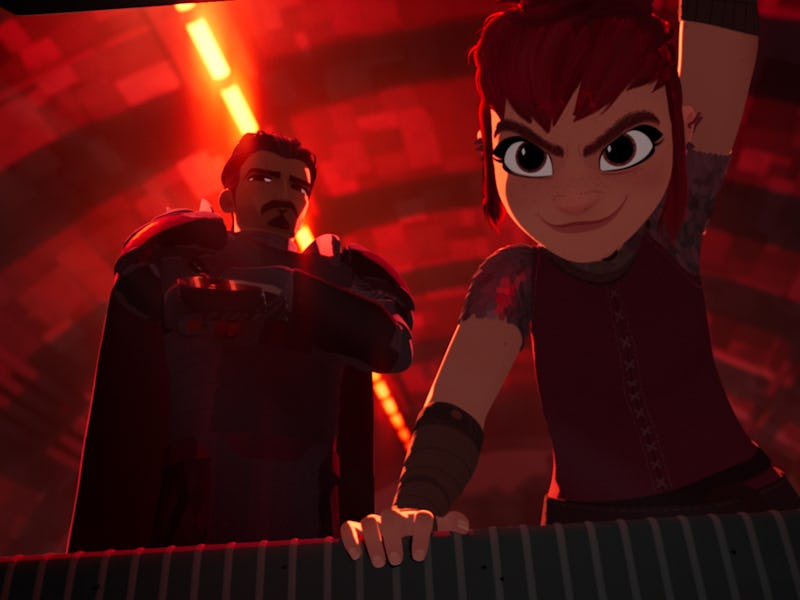2023 Was a Banner Year for Animated Movies — Why Did We Overlook One of the Best?
In a year packed with radical animated stories, Nimona deserves a bit more time in the sun.

Once upon a time, Fox’s Blue Sky Studios was hard at work on a radical animated film. Conceived as an anti-establishment, pro-LGBTQ adventure in a far-flung medieval realm, Nimona was poised as a radical wake-up call for a sleeping animation industry. But its existence wasn’t always guaranteed: when Disney took over Fox, shuttering Blue Sky and all of its upcoming projects, Nimona itself seemed doomed to a dreamless slumber. Fortunately, Netflix and Annapurna Animation swooped in to recover the project in the midnight hour. Production swiftly resumed, and in June 2023, Netflix finally unleashed Nimona.
There’s likely no better time for something like Nimona to exist. It’s the rare family-focused film with explicitly queer themes, and its messaging is less of a show-stopping statement than it is an argument for authenticity. Equally timely is its take on a less-orthodox animation style: its blend of illustrative 2D and graphic 3D animation puts Nimona smack-dab in Hollywood’s ongoing animation renaissance. It holds up well against the game-changing techniques in Spider-Man: Into the Spider-Verse or this year’s Teenage Mutant Ninja Turtles, and inadvertently makes Disney’s attempts at similar ingenuity feel even less developed.
For all its novelty, though, Nimona remains slightly under the radar. It didn’t make much of a splash when it hit Netflix back in June, though it garnered glowing praise from critics and audiences alike. While it still has a shot at some awards-season prestige, it hasn’t really made an impact. At this rate, Nimona’s on its way to becoming a cult classic — but considering all it went through just to get made, it deserves a bit more than that.
Nimona is, if nothing else, a love letter to the misunderstood. Before we even meet the “chaos goblin” the film shares its title with, we’re introduced to Ballister Boldheart (Riz Ahmed), himself something of a misfit in the near-future medieval kingdom he calls home. As the first commoner to graduate from the Institute for Elite Knights, Ballister is about to make history. Still, he’s on edge, if only because the issue of his low-class birth makes him a target for ridicule amongst other, high-born trainees.
Only Ambrosius Goldenloin (Eugene Lee Yang), the Institute’s beloved champion, accepts Ballister for the hero he truly is. Notably, he’s also his doting boyfriend — but that all changes when Ballister is framed for murdering Queen Valerin (Lorraine Toussaint) in the middle of their knighting ceremony. Ballister and Ambrosius find themselves on opposite sides of the law: while Ambrosius and his fellow knights work to hunt him down, Ballister tries to hatch a plan to clear his name.
It’s to this noble cause that Nimona eventually lends her services, though the finer details of her partnership with Ballister are initially lost in translation. Nimona believes that Ballister actually did murder the queen, which aligns with their quest to uproot the very fabric of their snobby society. Not unlike Ballister, Nimona is also an outcast. They’re a shape-shifter, gifted with the ability to transform into any animal at will. That makes Nimona a monster to anyone that witnesses those powers, Ballister included — but their reluctant alliance will force him to challenge the stigmas that keep their realm afloat, and Ballister himself from truly taking up space in it.
Nimona’s world isn’t as idyllic as it seems — and characters like Ballister and Ambrosius learn this the hard way.
For better or worse, Nimona is a story that straddles both past and future. The film eschews the noodle-y aesthetics of its source material, the graphic novel by ND Stevenson, for designs inspired by Disney’s Golden Age and minimal modernism. It makes for a kinetic blend of old and new, and it only strengthens the cyberpunk, high fantasy world its characters play in. Unfortunately, Nimona takes less-exciting liberties with the source material, trading Stevenson’s pricklier themes for more formulaic fairytale beats. It parses out easy-to-swallow meditations on conformity and The Other in the same way a traditional Disney movie would. It’s ironic that Disney was reportedly wary of the film’s explicitly queer themes: had it not been for the trans allegory hiding in plain sight (Nimona makes it clear they’re “not a girl,” though they often present as one), Nimona would have slotted effortlessly into the company’s low-stakes catalog.
A simplistic story, while a little frustrating, isn’t quite enough to damn Nimona entirely. It’s still a miracle that the movie exists — not only as a retort against Disney’s concerning corporate strategy, but as a radical new fairytale for those rarely represented within the genre. Nimona can lose its bite at times, but it’s refreshingly eager to unpack the prejudices baked into any society, and to check the figures that benefit the most from upholding it. It’s still early days for the film, and the fact that it’s on Netflix for anyone to discover makes it ripe of reappraisal. Hopefully Nimona will continue to find its audience, and eventually gets its flowers — sooner rather than later.